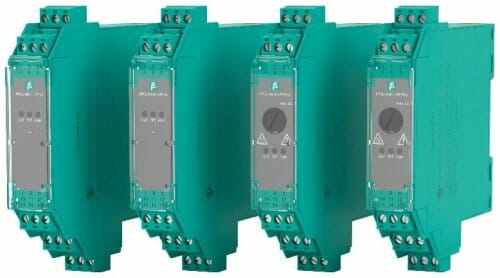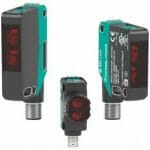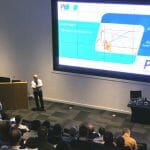The new KFD2-RSH safety relays from Pepperl+Fuchs combine a diagnostic function, line fault transparency, and dual redundancy in a 1oo3 (one out of three) architecture. During each switching operation, the function of the switching contacts is automatically checked. This drastically reduces the effort required for proof testing. Thanks to line fault transparency, the entire signal circuit can be monitored for line faults without the need for additional wiring. The relays are immune to test pulses and are therefore compatible with digital output cards for all common control panels.
The 1oo3 architecture with dual redundant switching contacts is at the core of the new modules. For DTS (de-energized-to-safe) applications, there are three serial contacts. For ETS (energized-to-safe) signal circuits, there are two groups of three contacts each, arranged in parallel. The safety function is ensured, even if up to two contacts in a group fail.
The integrated diagnostics function moves the three contacts successively with a time delay during each switching operation. In ETS applications, all three relays of both contact groups are initially closed with three consecutive switching events. During the delay period, the device checks whether this contact closes the circuit and detects any faulty circuits.
DTS device diagnosis takes place during the restart process. Initially, two relay contacts are closed simultaneously, then the third contact is closed after a time delay. The idea is that there is no current flowing before the third contact closes, otherwise this relay is defective because it no longer disconnects the circuit. Another relay is checked during every switching cycle.
After switching three times, the relay module is fully tested once without any additional effort. The diagnostics results are provided:
• via the LED on the module
• as a collective error message on the power feed module
• by evaluating the test pulses from the control panel
• on the additional relay output
The KFD2-RSH safety relays provide comprehensive line fault transparency. As a result, short circuits and lead breakages can also be detected on the field side through the control system’s digital output card (DO card) and assigned to a specific signal circuit. No additional wiring is required.
DO cards on control panels often offer built-in diagnostic functions. The module input effectively filters the test pulses coming from the DO card. This prevents an unintentional switching of the field device as a result of a diagnosis measure or the unintentional display of a line fault in the control panel.
The single-channel devices are certified in accordance with the ATEX/IECEx Zone 2 and UL standards and are suitable for DTS and ETS applications up to IEC61508 SIL 3. The DTS modules are also suitable for applications up to EN ISO 13849 PL e
Automation is our world. A Perfect application solution is our goal.
A willingness to take entrepreneurial risks, a pioneering spirit, and a firm belief in their own inventive powers – these were the assets that Walter Pepperl and Ludwig Fuchs started out with when they opened their Mannheim radio repair shop in 1945. Their invention of the proximity switch a few years later proved their strength. It was also the starting point in a successful history defined by close customer relationships as well as innovative automation technologies and procedures. Then as now, our focus is directed squarely on the individual requirements of each customer. Whether as a pioneer in electrical explosion protection, or as a leading innovator of highly efficient sensors – the close communication with our customers is what allowed us to become the leader in automation technology. Our main objective is combining state-of-the-art technologies and comprehensive services to optimize our customers’ processes and applications.
For more information, please visit our website:
www.pepperl-fuchs.com





